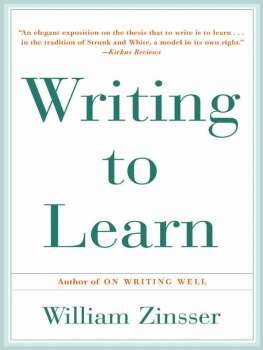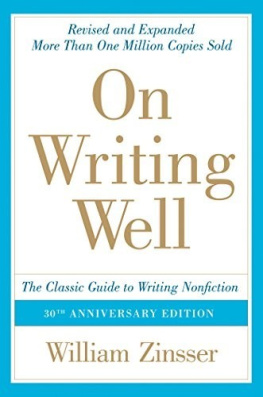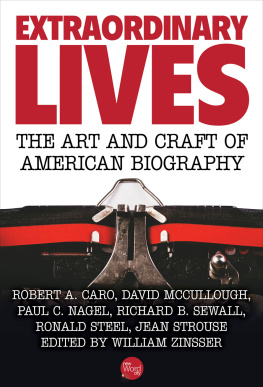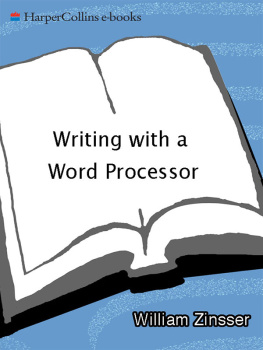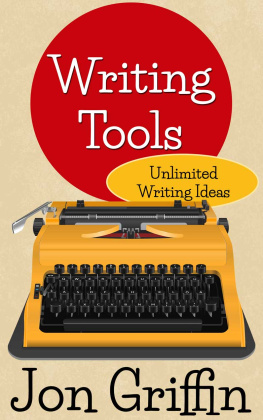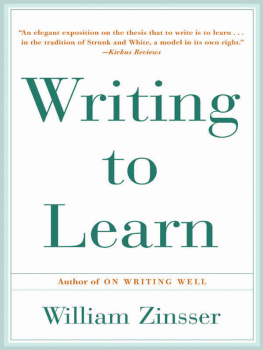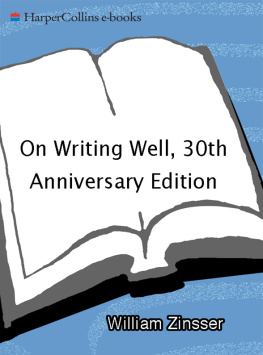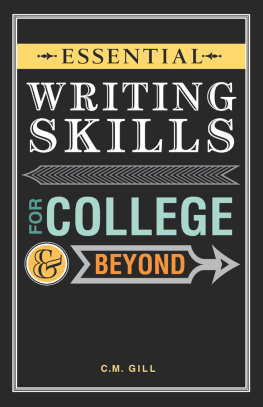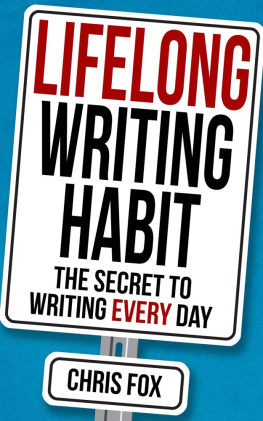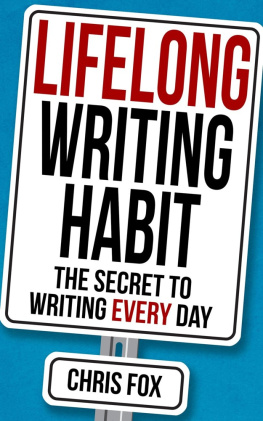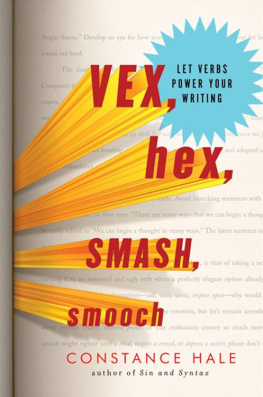William Zinsser - Writing To Learn
Here you can read online William Zinsser - Writing To Learn full text of the book (entire story) in english for free. Download pdf and epub, get meaning, cover and reviews about this ebook. year: 1993, publisher: Harper Perennial, genre: Detective and thriller. Description of the work, (preface) as well as reviews are available. Best literature library LitArk.com created for fans of good reading and offers a wide selection of genres:
Romance novel
Science fiction
Adventure
Detective
Science
History
Home and family
Prose
Art
Politics
Computer
Non-fiction
Religion
Business
Children
Humor
Choose a favorite category and find really read worthwhile books. Enjoy immersion in the world of imagination, feel the emotions of the characters or learn something new for yourself, make an fascinating discovery.
- Book:Writing To Learn
- Author:
- Publisher:Harper Perennial
- Genre:
- Year:1993
- Rating:3 / 5
- Favourites:Add to favourites
- Your mark:
- 60
- 1
- 2
- 3
- 4
- 5
Writing To Learn: summary, description and annotation
We offer to read an annotation, description, summary or preface (depends on what the author of the book "Writing To Learn" wrote himself). If you haven't found the necessary information about the book — write in the comments, we will try to find it.
Writing To Learn — read online for free the complete book (whole text) full work
Below is the text of the book, divided by pages. System saving the place of the last page read, allows you to conveniently read the book "Writing To Learn" online for free, without having to search again every time where you left off. Put a bookmark, and you can go to the page where you finished reading at any time.
Font size:
Interval:
Bookmark:

Hermes and the Periodic Table
Writing Across the Curriculum
A Liberal Education
Writing to Learn
Crotchets and Convictions
Earth, Sea and Sky
Art and Artists
The Natural World
Writing Mathematics
Man, Woman and Child
Writing Physics and Chemistry
Worlds of Music
On Writing Well
Writing to Learn
Mitchell & Ruff
Spring Training
American Places
Easy to Remember: The Great American Songwriters and Their Songs
Writing About Your Life
Speaking of Journalism
Writing with a Word Processor
Writing Places
Edited by William Zinsser
Inventing the Truth: The Art and Craft of Memoir
Worlds of Childhood: The Art and Craft of Writing for Children
Going on Faith: Writing as a Spiritual Quest
Copyright acknowledgments will be found in Sources and Notes, beginning on .
A hardcover edition of this book was published in 1988 by Harper & Row, Publishers.
WRITING TO LEARN . Copyright 1988 by William K. Zinsser. All rights reserved under International and Pan-American Copyright Conventions. By payment of the required fees, you have been granted the non-exclusive, non-transferable right to access and read the text of this ebook on-screen. No part of this text may be reproduced, transmitted, down-loaded, decompiled, reverse engineered, or stored in or introduced into any information storage and retrieval system, in any form or by any means, whether electronic or mechanical, now known or hereinafter invented, without the express written permission of HarperCollins ebooks.
First PERENNIAL LIBRARY edition published 1989.
Library of Congress Cataloging-in-Publication Data
Zinsser, William Knowlton.
Writing to learn.
Perennial Library.
Bibliography: p.
Includes index.
1. English languageRhetoricStudy and teaching.
2. Interdisciplinary approach in education. I. Title.
PE1404.Z56 1989 808.04207 87-45825
ISBN 0-06-272040-6 (pbk.) 08 07 06 05 RRD 30 29 28 27 26 25 24 23 22 21
EPub Edition MAY 2013 ISBN: 9780062244697
I wrote this book to try to ease two fears that American education seems to inflict on all of us in some form. One is the fear of writing. Most people have to do some kind of writing just to get through the daya memo, a report, a letterand would almost rather die than do it. The other is the fear of subjects we dont think we have an aptitude for. Students with a bent for the humanities are terrified of science and mathematics, and students with an aptitude for science and mathematics are terrified of the humanitiesall those subjects like English and philosophy and the arts that cant be pinned down with numbers or formulas. I now think that these fears are largely unnecessary burdens to lug through life.
This book is a personal journey in which I confronted some of my own fears and lived to tell the tale. What started me on it was my interest in the trend in American schools and colleges called writing across the curriculum, whereby writing is no longer the sole possession of the English teacher but is an organic part of how every subject is taught. Its an idea I like very much. It establishes at an early age the fact that writing is a form of thinking, whatever the subject. It also makes writing more appealing by enabling students to write about subjects that interest them and that theyre good at. The chemistry student who freezes at the mention of Shakespeare or Shelley can write surprisingly well about how oxidation causes rustor could if anyone asked him to.
Up to now most teachers havent thought of such subjects as being reachable through writing or as having any kind of literature. But every discipline has a literaturea body of good writing that students and teachers can use as a model; writing is learned mainly by imitation. Therefore I decided to look for the literature myself: to collect brief examples of good, accessible writing in a variety of academic disciplines. My hope was to demystify writing for the science types and to demystify science for the humanities types.
One condition I set was to stick close to the formal discipline. I wouldnt look for writing, for instance, by journalists, good though it might be. If the discipline was geology I wanted good writing by a geologist. If it was evolution I wanted Darwin, if it was relativity I wanted Einstein, if it was cell biology I wanted Lewis Thomas. 1 wanted to show that its not necessary to be a writer to write well. Clear writing is the logical arrangement of thought; a scientist who thinks clearly can write as well as the best writer. My book, in short, would be mainly an anthologya guided tour of good writing in different crannies of the B.A. curriculum.
But something happened when I actually started to write. The book took on a life of its own and told me how it wanted to be written. I found myself yanked back to many corners of my pastto long-forgotten people and projects and travels that together taught me much of what I know. I realized that my life had been a broad education and that I couldnt write a book about learning without saying how much it has meant to me to be a generalist in a land that prefers narrow expertise. The anthology began to look suspiciously like a memoir.
I didnt fight the current. On the contrary, the writing of the book proved one of its central points: that we write to find out what we know and what we want to say. I thought of how often as a writer I had made clear to myself some subject I had previously known nothing about by just putting one sentence after anotherby reasoning my way in sequential steps to its meaning. I thought of how often the act of writing even the simplest documenta letter, for instancehad clarified my half-formed ideas. Writing and thinking and learning were the same process.
The light bulb that went on over my head at this discovery told me what my book was really about. I saw that writing across the curriculum wasnt just a method of getting students to write who were afraid of writing. It was also a method of getting students to learn who were afraid of learning. I was once such a student, morbidly afraid of the sciences and other disciplines that looked alien and forbidding. Now I began to think that I could have written and thereby reasoned my way into those disciplinesfar enough, at least, so that they would have lost their terrors.
The only thing I didnt understand was exactly how this would work. How would someone, for instance, write chemistry, or physics, or geology? My journey led me to professors in different parts of the country who told me. Well, then, how about mathematics? Surely that couldnt be written. Surely it could. Joan Countryman (Chapter 9) cured even my math anxiety. This is a book full of born teachers.
But above all its a book full of ideasother peoples ideasand what Id like most is for readers to just enjoy those people and those ideas. Nothing about the book is definitive. Ive left out many disciplines that other writers might have put in; my purpose is to suggest possible approaches, not to touch every base. Similarly, my examples of good writing are just one mans choicespassages I happened to know about or happened to discover during my trip. One of the pleasures of writing the book, in fact, was not knowing who I would meet.
Once I met them, however, there was no mistaking the men and women I wanted to have along on the ride. They all had the rare gift of enthusiasm. Again and again I was struck by the exuberance that these writers brought to what they were writing about. Whoever the writer and whatever the subjectthe biologist Rachel Carson writing about life on the ocean floor, the anthropologist Clifford Geertz writing about a cockfight in Bali, the art historian A. Hyatt Mayor writing about the lithographs of Toulouse-Lautrec, the zoologist Archie Carr writing about the giant sea turtle, the psychiatrist Robert Coles writing about the gallantry of children under stress, the naturalist John Muir writing about an earthquake in Yosemite Valley, the composer Roger Sessions writing about Beethoven and the mystery of compositionthe common thread is a sense of high enjoyment, zest and wonder. Perhaps, both in learning to write and in writing to learn, they are the only ingredients that really matter.
Font size:
Interval:
Bookmark:
Similar books «Writing To Learn»
Look at similar books to Writing To Learn. We have selected literature similar in name and meaning in the hope of providing readers with more options to find new, interesting, not yet read works.
Discussion, reviews of the book Writing To Learn and just readers' own opinions. Leave your comments, write what you think about the work, its meaning or the main characters. Specify what exactly you liked and what you didn't like, and why you think so.

